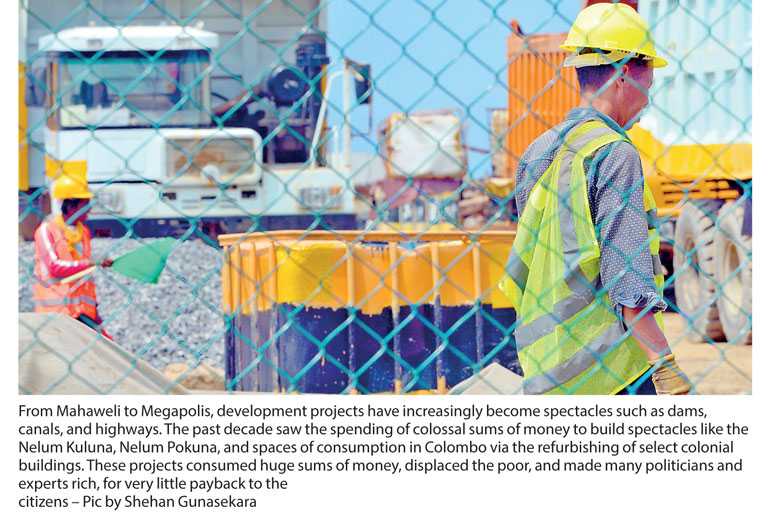Friday Feb 20, 2026
Friday Feb 20, 2026
Wednesday, 23 May 2018 00:00 - - {{hitsCtrl.values.hits}}

 Renegotiating a country’s position within the world-economy is only possible when the system and/or leaders are in trouble. The capitalist world-economy was in crisis in the late 1970s-’80s.It was reproduced through the development of what was later called neo-liberalism. A few states like Taiwan and Korea seized the day, but not Sri Lanka. By accepting structural adjustments, the government and experts reproduced its Third World status.
Renegotiating a country’s position within the world-economy is only possible when the system and/or leaders are in trouble. The capitalist world-economy was in crisis in the late 1970s-’80s.It was reproduced through the development of what was later called neo-liberalism. A few states like Taiwan and Korea seized the day, but not Sri Lanka. By accepting structural adjustments, the government and experts reproduced its Third World status.
The 1977-regime redefined Sri Lanka’s subordinate position. It enjoyed foreign loans and mega projects, causing indebtedness and further dependency, but promised a Singapore. The national economy grew much faster in the 1980s-90s, but the gap between the rich and the poor increased; Sri Lanka’s Gini Coefficient was 40-45 in 2014. However, all welfare was not eradicated and the structural adjustments were not complete. This is due to the strength of what the socialists had established. The mega projects from Jayewardene (1977-1989) to Wickremesinghe (2015-current) belong to this combination of neoliberalism and structural adjustments, with some remnants of “welfarism”.
From Mahaweli to Megapolis, development projects have increasingly become spectacles such as dams, canals, and highways. The past decade saw the spending of colossal sums of money to build spectacles like the Nelum Kuluna, Nelum Pokuna, and spaces of consumption in Colombo via the refurbishing of select colonial buildings including the Race Course, Independence Arcade, and the newly-built Diyatha Uyana. These projects consumed huge sums of money, displaced the poor, and made many politicians and experts rich, for very little payback to the citizens. This is the Third World version of what the creator of the field of international political-economy, Susan Strange, calls Casino Capitalism.
Subjecting to power: Mega confusion
The most pertinent opportunity is here and now. The capitalist world-economy is in a more radical crisis. The little we know informs us that we are experiencing either the demise of the system or the rise of another hegemon; either way, the new power will bring about a new world-order. Most analysts believe the leader will be China and/or India.
Once a state establishes its hegemony and order, it will be difficult for a weaker country to renegotiate the position within that structure while it is strong. Hence, the time to negotiate is now, while the structures are still being formed.
The transition period is marked by competition and negotiations between the potential hegemons (China and India), the extant power (USA), and influential states such as Russia. While China is trying to find a path via the Belt Road Initiative, and keeps building ghost towns, India is exploiting its own resources displacing and turning indigenous people into rebels. The competition may include wars; two world wars according to Immanuel Wallterstein who theorised the capitalist world-economy. For weaker states, the current conjuncture provides a rare opportunity to negotiate their positions within the emerging world-order and to take part in its shaping.
This is certainly not the time for Sri Lanka to act like a subordinate state, get into petty fights, or mortgage the country. The last Government attacked US imperialism, but the USA is the fading hegemon and such protests have very little political-economic impact for the nation. Sri Lanka needs to negotiate with the rising powers.
It was a grave mistake for the previous Government to construct a subordinate position vis-à-vis China. A better option is to push for the best possible political-economy and to negotiate and/or construct the best position within it for the nation. The main prerequisite to this is knowledge, but also requires persuasion and diplomacy. None of the recent governments have shown such intent.
China and India can be viewed as assets. The Lankan State can question the intentions and roles of the rising powers, map out the kinds of relationships it wishes to build with them, and find ways to negotiate the most favourable position vis-à-vis these states and the global structures they are building.
Empowerment?
The need for
grounded knowledge
The main cause for the missed opportunities is the lack of knowledge. National rulers and experts sorely lack an understanding of development opportunities, especially how the capitalist world-economy operates, goes into crises, the structural constraints it imposes, and openings for change it offers. A more fundamental cause is the lack of grounded-knowledge, a sense of nation, a national vision, potential development paths, and an assessment of capabilities of the nation.
Development is expected to benefit the citizens. According to Amartya Sen, “development should enable people to lead the kind of lives they have reason to value” whether it is supported or not by an increase in the GNP, technical progress, or industrialisation. This implies people providing for themselves, within limits, in their own ways, with appropriate external support.
This idea is not new to Sri Lanka; in the 1980s, Susil Sirivardana and Eswaran Selvarajah led the development of a housing policy based on supporting people’s initiatives. Lankan experts need to look within the country for successful and effective grounded examples and draw on them.
As I have demonstrated in the book, ‘People’s Spaces,’ people have agency; they conceive and create spaces for their daily activities and cultural practices. They create more life opportunities and spaces than the state, capital, and other external providers. The state cannot do what people can do; nor can private businesses, or NGOs. By achieving their life goals, people develop the nation. People are the prime resource, infrastructure, and the beneficiary of development.
It is more effective and efficient for the state to help people empower themselves, i.e., to support people’s life journeys by enhancing their capabilities and removing roadblocks that hinder the achievement of their aspirations. By empowering, I refer to the enhancement of people’s capability to conduct their life journeys and achieve their aspirations. For example, providing an effective transportation service is more crucial than building roads; a transportation system has no meaning for passengers if the bus does not stop for them and some men harass women who use the service.
In sum, Sri Lanka needs a vision and a cadre of intellectuals and professionals who can develop grounded knowledge that matters. Most experts do not care for local knowledge, largely because they do not value it; they have never learned its value. There have been successful development projects and programs in Sri Lanka and the experts ought to derive knowledge from these, combining with external experiences.